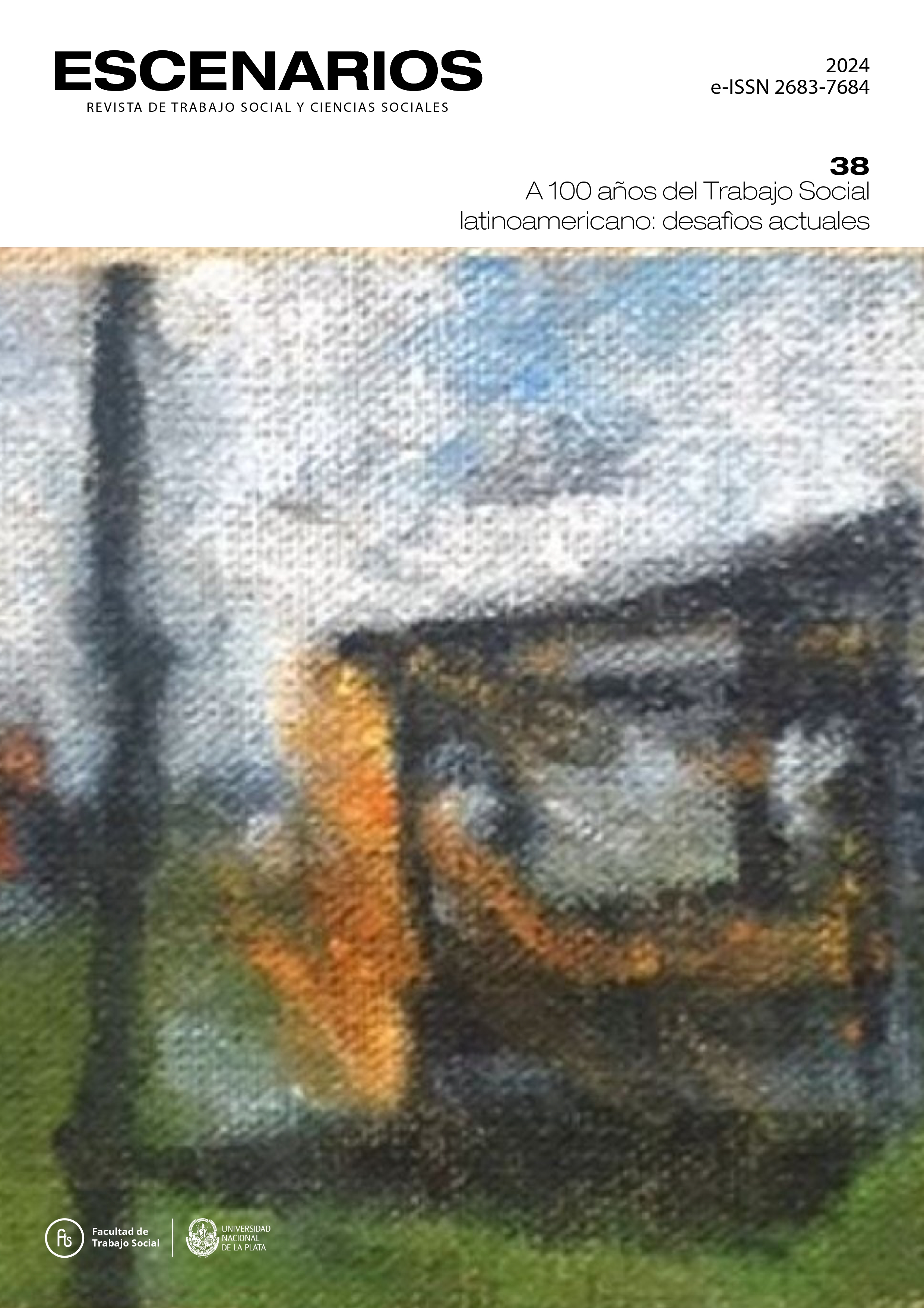Contributions of political theory to political analysis in social intervention processes
DOI:
https://doi.org/10.24215/26837684e017Keywords:
The politics, power relationships, hegemony, latinamerican social theory, social intervention, politics analysisAbstract
The work presented here focuses mainly on our experience as teachers of the Specialization in social intervention with children, adolescents and young people. Thus, the reflections that we share are doubly determined, on the one hand, because it is a situated reflection derived from a theoretical teaching exercise and, on the other hand, because the analysis tools that we propose are determined by the consideration of the recipients of that experience, State intervention agents with a very marked professional profile. We know that a question that crosses the scenarios of social intervention is the expression of "the political" or how the political becomes one of its most significant determinations. At the same time, the professional intervention itself is permanently questioned by the political: the relations of power and domination -inherent to the problems that mobilize it- strain the professional practice itself. In this sense, an important challenge of the intervention processes is the analysis of the political, for this reason we intend to review some theoretical contributions that allow: characterizing the political by delimiting it from other activities or social practices; distinguish politically relevant facts; and analyze the relations of power and domination that structure the political. We believe that these contributions, taken as a whole and systematically, constitute a possible initial and basic matrix for situated political analysis or political analysis in intervention scenarios.
Downloads
Metrics
References
Arendt, H. (2006). La condición humana. Paidós.
Argumedo, A. (1991). Los silencios y las voces en América Latina: notas sobre el pensamiento nacional y popular.
Ediciones del Pensamiento Nacional.
Cazzaniga, S. (2009). Sobre la imposibilidad de la intervención profesional. Reflexiones para poder repensar [Ponencia]. Jornadas de Investigación en Trabajo Social. Universidad Nacional de Entre Ríos. Paraná, Argentina.
Engels, F. (2017). El origen de la familia, la propiedad y el Estado. Marxists Internet Archive.
Go, J. (2019). El pensamiento poscolonial como teoría social. En C. Benzecry, M. Krause y I. Reed (Eds.), La teoría social, ahora. Nuevas corrientes, nuevas discusiones. Siglo Veintiuno Editores.
Gramsci, A. (1997). Notas sobre Maquiavelo, sobre la política y el Estado moderno. Nueva Visión.
Hall, S. (2017). Estudios culturales 1983. Una historia teorética (Trad. A. Bixio). Paidós. (Trabajo original publicado en 1983).
Kuhn, T. (1980). La estructura de las revoluciones científicas. Fondo de Cultura Económica.
Marchart, O. (2009). El pensamiento político postfundacional. La diferencia política en Nancy, Lefort, Badiou y Laclau. Fondo de Cultura Económica.
Marx, K. (2015). Antología (Trad. P. Scarón). Siglo Veintiuno Editores.
Marx, K. y Engels, F. (2015). Manifiesto del Partido Comunista (Trad. H. Tarcus). Siglo Veintiuno Editores.
Maquiavelo, N. (1965). Obras Maquiavelo (Comp. J. A.G. Larraya). Vergara.
Mouffe, C. (2007). En torno a lo político (Trad. Soledad Laclau). Fondo de Cultura Económica. (Trabajo original publicado en 2005).
Quijano, A. (2019). Ensayos en torno a la colonialidad del poder. Ediciones del Signo.
Schmitt, C. (1984). El concepto de lo político. Folios Ediciones.
Wolin, S. (1974). Política y perspectiva. Continuidad y cambio en el pensamiento político occidental. Amorrortu Editores.
Additional Files
Published
How to Cite
Issue
Section
License
Copyright (c) 2024 Carolina Escudero, Julio Sarmiento, Mariel Payo

This work is licensed under a Creative Commons Attribution-NonCommercial-ShareAlike 4.0 International License.
La aceptación de colaboraciones por parte de la revista implica la cesión no exclusiva de los derechos patrimoniales de los autores a favor del editor, quien permite la reutilización, luego de su edición en papel (postprint), bajo Licencia Creative Commons Atribución-NoComercial-CompartirIgual 4.0 Internacional (https://creativecommons.org/licenses/by-nc-sa/4.0/).
La cesión de derechos no exclusivos implica también la autorización por parte de los autores para que el trabajo sea alojado en el repositorio institucional de la UNLP SEDICI y difundido a través de las bases de datos que el editor considere apropiadas para su indización, con miras a incrementar la visibilidad de la revista y sus autores.






















